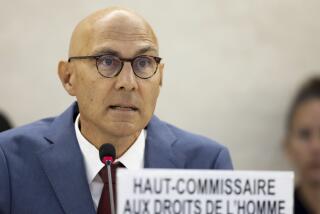Budget Woes Skew Peacekeeping Role, U.N. Chief Says
- Share via
UNITED NATIONS — Secretary General Boutros Boutros-Ghali warned the Security Council on Tuesday that the accelerating financial crisis of the United Nations is forcing the world organization to choose its peacekeeping missions in an unfair way.
His remarks, made to a special session in which foreign ministers represented the governments on the council, came as the United Nations announced that its members now owe $3.5 billion in assessments. The United States is the nation most in arrears, owing $1.5 billion--almost half the debt.
Faced with this enormous shortfall in dues payments, a financially harassed United Nations feels pressured to send peacekeepers only to areas under the glare of a world spotlight, the secretary general said. As a result, he went on, the United Nations “uses a double standard in its selection of missions in the service of peace.”
“Certain conflicts therefore risk being ignored for reasons that have nothing to do with the amount of their suffering,” Boutros-Ghali said.
The secretary general’s warning reflected his longstanding belief that televised images of war and famine have an undue influence on diplomats and politicians.
Seeking to clarify his point outside the council chambers, Boutros-Ghali told The Times: “We are spending only $25 million in Liberia. That is what five days’ peacekeeping costs us in Yugoslavia. There is a double standard.”
The U.N. statistics reveal a pattern: The big debtors such as the United States have been paying much, though not all, of their assessments late in the year--even though the bills are due much earlier--and then allowing debts to pile up for a number of years.
For its regular budget, the United Nations said it is owed $451 million for this year’s assessments and $397 million for old debts. For its peacekeeping budget, the United Nations said it is owed $1.8 billion for this year’s assessments and $858 million for past years’.
The United States, with a debt of $527 million, is, for all practical purposes, the only cause of the shortfall in the regular U.N. budget. On peacekeeping debts, the United States, which owes about $1 billion, has a few distant rivals: Russia owes $564 million, Japan owes $184 million and Ukraine owes $184 million.
Although the United States is the chief offender, many diplomats accept the fact that the problem lies with a Congress that refuses to recognize U.N. assessments as ironclad treaty obligations and likes to punish the United Nations or impose conditions before releasing funds.
British Foreign Secretary Malcolm Rifkind told a news conference that “the main problem was not the U.S. Administration but the Congress.” He said it is necessary to persuade Congress that “the world cannot exist without the U.N. It would be a disaster.”
But he added, “I am afraid we are close to collapse.”
In a sharp statement, the foreign ministers of the Nordic countries--Denmark, Finland, Iceland, Norway and Sweden--said: “It is unacceptable, and particularly deplorable at the 50th anniversary of the United Nations, that the central instrument for international cooperation on vital global issues is practically bankrupt, due to the failure of member states to pay their assessed contributions in full, on time and without conditions.”
More to Read
Sign up for Essential California
The most important California stories and recommendations in your inbox every morning.
You may occasionally receive promotional content from the Los Angeles Times.












